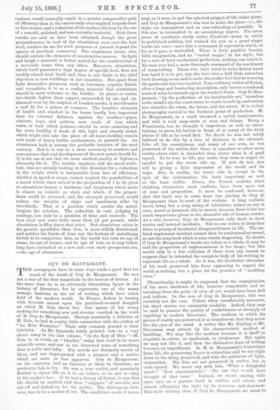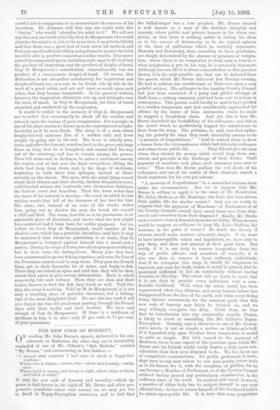GUY DE MAUPASSANT. T HE newspapers have in some ways made
a good deal too much of the death of Guy de Maupassant. He was not a star of the fret magnitude in the heaven of letters. At the same time he is an extremely interesting figure in the history of literature, for he represents one of the many strange fashions in the art of writing which have taken hold of the modern world. In France, fiction is tossing with feverish unrest upon the patchouli-scented dunghill on which M. Zola threw her. One spasm of her weary seeking for something new and strange resulted in the work of M, Guy de Maupassant. Though nominally a follower of M. Zola, he had in reality little connection with the author of "La Bete Humaine." Their only common ground is their lubricity. As Mr. Symonds lately pointed out—in a very clever essay in his last volume, "In the Key of Blue "—M. Zola is, in truth, an " Idealist," using that word in its strict scientific sense, and not in the borrowed sense of something that is noble and lofty. His novels are distinctly novels of ideas, and are impregnated with a purpose and a motive which are more or leas apparent. Guy de Maupassant, on the contrary, had no theories or ideas to illustrate, no particular fish to fry. He was a true realist, and genuinely desired to throw life as it is—or rather, as he saw it—slap in his reader's face. If he had a theory of fiction, it was that life should be studied, and then " snippets " of suitable size cut oif and dished-up for the public. The dishing-up, how- ever, was to be a matter of art. The conditions made it neces. sary, as it were, to put the selected snippet of life under glass; and Guy de Maupassant's aim was to make the glass—i.e., the style—as transparent and as non-refracting as possible. In this aim he triumphed to an astonishing degree. His seven years of assiduous study under Flaubert—years in which he published nothing, but trained his pen as a great singer trains his voice—gave him a command of expression which, as far as it goes, is unrivalled. There is little positive beauty, little imagination, and no "verbal magic," in his style ; but for a sort of hard mechanical perfection, nothing can touch it. No man ever had a more thorough command of the machinery of story-telling. Those who have tried to write fiction know how hard it is to get, say, the hero into a dull little suburban back drawing-room, and to make the reader feel that he is seeing the particular interior required. Your ordinary writer of fiction, after a long and lumbering description, only leaves a confused sense of w bat he intends upon the reader's brain. Guy de Mau- passant, " by the perfection of his inestimable art," transfers to the mind's eye the exact scene he wants to call up, and makes you visualise the room, the house, and the street. It is verbal photography carried to the furthest point of perfection. M. de Maupassant, in a word, invented a verbal hand-camera, and with it took snap-shots at men and things. Being a Frenchman, too, he thought it important, as well as enter- taining, to press his button in front of as many of the dirty places of life as he could find. No doubt he was not solely induced to do this by a love of dirtiness in the abstract. Like all his countrymen, and many of our own, he was possessed of the notion that there is somehow or other more reality about what is shameful, than about what is of good report. To be true to life, you must, they seem to argue, be careful to put the worse side up. If you do not, you will be giving a false impression of the world and its ways. But, in reality, the worse side is, except in the eyes of the erotomaniac, the least important as well as the least visible. Hence, the French realists, when thinking themselves most realistic, have been most out of tone and proportion. It must be confessed, however, that this fault was in some ways less glaring in Guy de Maupassant than in most of the realists. A long realistic novel, being but a long string of lubricities, makes us say at once, moral or immoral, this is unreal, because there is far too much importance given to the shameful side of human nature. As a rule, however, Guy de Maupassant only dealt in short stories and isolated incidents. But no one wants to deny that there is plenty of incidental disagreeableness in life. The iso- lated unpleasant incident cannot then be condemned as unreal, as can the long book which is nine-tenths disgusting. No doubt, if Guy de Maupassant's works are taken as a whole, it may be said the proportion of unpleasantness is too large ; but this would only be a. fair criticism if there were any reason to suppose that he intended the complete body of his writing to represent life as a whole. As it was, the incidental character of his work preserved him from appearing to regard the world as nothing but a place for the practice of " madding vices."
Theoretically, it might be supposed that the manipulation of the mere incidents of life, however remarkable and in- teresting from the point of view of art, would have been dull and tedious. In the case of Guy de Maupassant, this was certainly not the case. Unless when unendurably nauseous, his short stories are eminently readable. Indeed, they may be said to possess the quality of readableness as strongly as anything in modern literature, The medium in which his pieces of reality are preserved is so translucent that they never tire the eyes of the mind. A writer like Mr. Kipling or Mr. Stevenson may attract by his characteristic method of handling. We may like the medium because it is itself so exquisite in colour, so opalescent, so irridescent. But again we may not like it, and then the distinctive form of writing becomes an impediment. In M. de Maupassant's transcripts from life, the preserving liquor is colourless, and we see right down to the thing preserved, and with the minimum of light- obstruction. His flies are not preserved in amber, but in rock-crystal. We never say with him, ' What a delightful touch 1" How characteristic ! " No one else would have thought of that turn !' Instead, we stand staring with open eyes at a picture hard in outline and colour, and almost affronting the sight by its nearness and clearness. But while writing thus of Guy de Maupassant, we must be careful not to exaggerate or to overestimate the success of his invention. Dr. Johnson said that any one could write like " Ossian " who would " abandon his mind to it." We will not say that any one could write like Guy de Maupassant who would abandon his mind to it, but at the same time, it may be truthfully said that there was a good deal of trick about his method, and that any one of sufficient ability and patience to master the trick would be able to produce somewhat similar results. Literature and all its component parts, including style, may be divided into the product of inspiration and the product of sleight-of-hand. Guy de Maupassant's contribution unquestionably was the product of a consummate sleight-of-hand. Of course, this distinction is not altogether satisfactory, for inspiration and sleight-of-hand are, as a rule, to be found side by side in the work of a great artist, and act and react so much upon each other, that they become inseparable. In the greatest writers, however, the inspiration ultimately eats up and triumphs over the trick of touch. In Guy de Maupassant, the trick of touch absorbed and swallowed up the inspiration.
It would be unfair to the memory of Guy de Maupassant not to notice that occasionally he shook off his realism and entered upon the realms of pure imagination. For example, in one of his short stories he draws upon the supernatural as light- heartedly as if he were Scott. The story is of a man whose deeply-beloved mistress dies of a sudden cold and fever caught by going ont in the wet. The lover is utterly pros- trate, and after the funeral, wanders back to the grave and stops there so long that he is benighted and cannot find his way oat of the cemetery, and has to remain among the graves. Thus left alone and in darkness, he notes a movement among the tombs, and at last sees the dead everywhere lifting the slabs that keep them down, and, in the shape of skeletons, beginning to write their true epitaphs, instead of those actually on the stones. The men, with the usual lying record about their virtues and their charity, declare themselves cruel, cold-blooded misers, the husbands own themselves faithless, the fathers cruel and heartless. Then the lover notes that the tomb of his beloved is moving,—the tomb on which he has written words that tell of the trueness of her love for him. She rises; but, instead of an echo of his words, writes how, going out to deceive the man she loved, she caught a chill and died. The scene, horrible as is its pessimism, is an admirable piece of literature, and shows what the bow might have achieved had it been bent for nobler purposes. Let us, before we leave Guy de Maupassant, recall another of his stories,—one which has a patriotic intention; and here it may be mentioned that whenever patriotism is at stake, Guy de Maupassant is betrayed against himself into a moral and a motive. During the siege of Paris, two old shopkeepers suddenly feel in their veins the fishing-fever. Every year they have been accustomed to go out fishing together, and even the fear of the Prussians cannot avail to stop them. They pass the French lines, get to their favourite bit of water, and begin to fish. There they are seized as spies and told that they will be shot, unless they agree to give certain information. Each is asked separately, but each refuses. Then they are shot, and their bodies thrown to feed the fish they loved so well. Told like this, the story is nothing. Told by M. de Maupassant, it is not only a touching piece of patriotic literature, but a fishing- idyl of the most delightful kind. No one who has read it will ever forget the two old gentlemen passing through the French lines with their tackle and their baskets. We have said enough of Guy de Maupassant. If there is a residuum of goodness in him, it is, alas ! only 25 per cent. to 75 per cent. of pure pessimism.



































 Previous page
Previous page